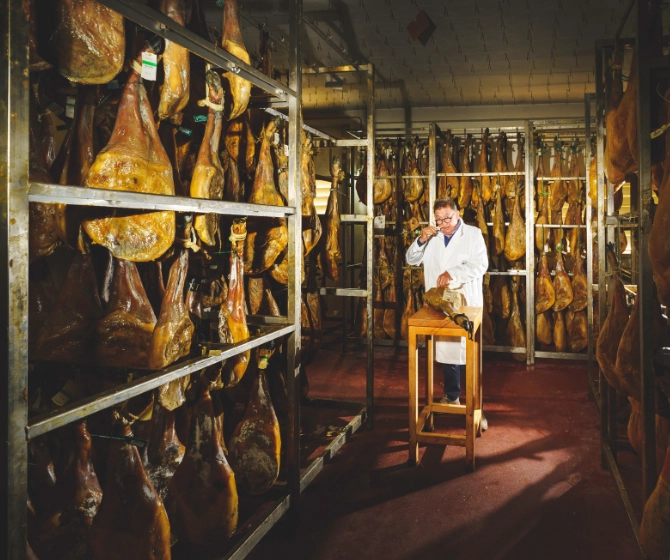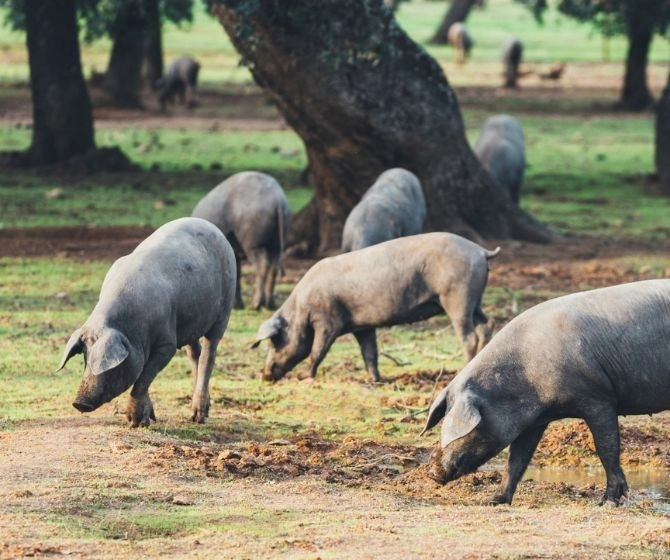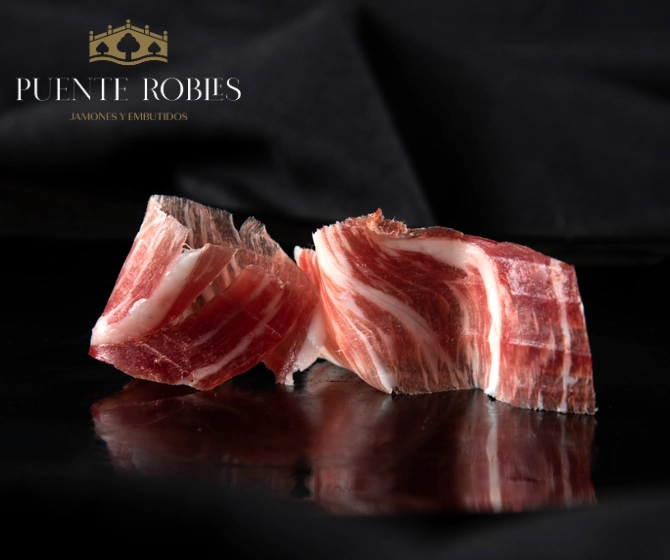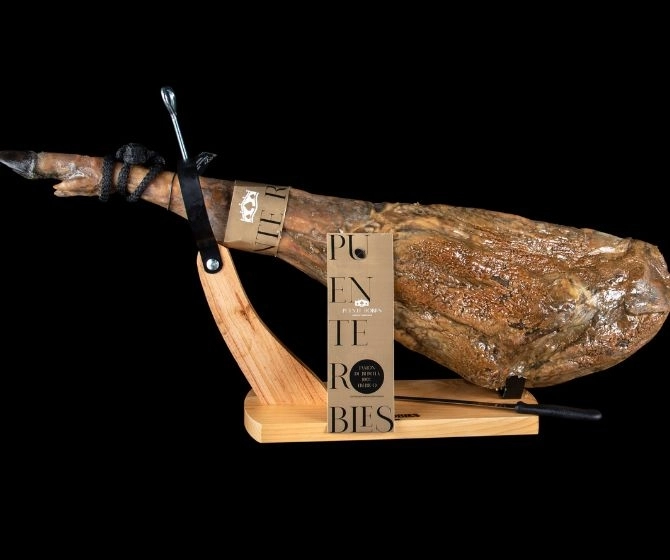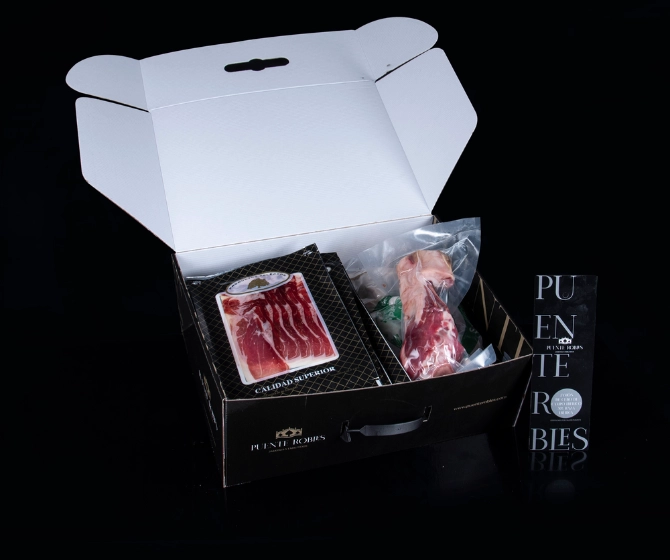Types of Iberian ham. Differences and labels.
In the fascinating world of Iberian cuisine, there is a treasure that stands out for its exquisiteness and nobility: Iberian ham. Considered one of the most prized products on the Spanish table, this delicacy has earned its place as a symbol of quality and tradition.
At Puente Robles, we can say that it is one of our star products, highly demanded by our customers at any time of the year. However, its high demand is no coincidence; it is the result of the great effort behind it. All the care we put in each phase of the traceability of our Iberian hams and the rest of our products, are the key to achieve that texture, taste and smell that define our emblem.
At Puente Robles, we have a wide selection of carefully cured Iberian hams that represent a tribute to tradition and where each thin slice transports us directly to the picturesque fields and pastures of Salamanca.
In this post, we want to delve further into each of the types of Iberian ham and thus be able to answer those oft-repeated questions such as, for example, which Iberian ham to choose, what is the main difference between one or the other or what is the reason for this economic difference.
Join us on this journey of flavors and become a ham expert.
Types of Iberian ham according to the breed of Iberian pig
The Iberian pig, also known as the black Iberian pig, is a breed originating in Spain, specifically native to the Iberian Peninsula. It constitutes 50% of the total production of pigs in Spain, with Extremadura being the leading region in the breeding of this breed.
A crucial aspect to consider is that only those pigs whose mother is of 100% purebred Iberian origin and whose father has a minimum of 50% of this same breed can be called "Iberian breed pigs".
It is this purity that serves as an indicator to correctly classify Iberian ham as 50%, 75% or 100% Iberian breed.
Acorn-fed Iberian ham 100% Iberian breed
Within our exclusive range of Iberian hams, the king of the table is the 100% Iberian Acorn-fed Acorn-fed Iberian Ham. This type of acorn-fed ham, also known as "Pata Negra", is distinguished for being the only one whose progenitors are of pure Iberian breed. This guarantees exceptional quality and unequaled flavor.
In Puente Robles, we follow several phases and processes until we find the final product. But something common in all of them is the commitment of the whole team to use the same techniques that our ancestors taught us and that have given us the recognition we have today.
Among the distinctive characteristics of this exquisite ham, we can highlight its thin and elongated leg, with a narrow shank and black hoof. Each piece is wrapped in a layer of shiny fat that preserves its juiciness and enhances its flavor.
Iberian acorn-fed ham 75% Iberian breed from Puente Robles
Acorn-fed Iberian Ham 75% Iberian breed is distinguished by its breeding process, which involves crossing a 100% Iberian breed mother with a 50% Iberian breed father. It is of the utmost importance for our company and for our customers to guarantee this genetic composition, which is why we pay meticulous attention to the traceability of the animal, raising them ourselves in the wild in the Dehesa Salmantina on our property.
This type of Iberian ham, obtained from the hind legs of pigs with a percentage of 75% Iberian purity, is cured for 36 months before being marketed. During this time, only 3 months will be exposed to a dryer. The rest of the curing process is carried out as our ancestors used to do, in the open air. A 100% natural way that allows us to put into practice our facilities and that assures us to fulfill the final requirements of this product.
In our online store, we offer Iberian Acorn-fed Ham 75% Iberian Breed in whole pieces ranging from 7 to 10 kg, as well as in more convenient formats, either sliced by machine or by knife by expert ham cutters. Regardless of the option you choose, we guarantee that it will arrive at your doorstep in optimum preservation conditions, ready for you to enjoy it from the very first moment.
Acorn-fed Iberian Ham 50% Iberian Breed from Puente Robles
Acorn-fed Iberian Ham 50% Iberian Breed, although it has a lower percentage of purity compared to the previous types of Iberian ham, it fully preserves the unmistakable flavor and aroma that distinguish this breed of Iberian pigs.
As explained above, this type of ham comes from a 100% Iberian mother and a father, in this case, of a non-Iberian breed. Despite this genetic composition, the Puente Robles team spares no effort and continues to meticulously select raw materials of the highest quality, devoting exceptional attention to each stage of the production process.
And after a curing period of between 24 and 36 months, we are able to offer our demanding customers a final product of superior quality. How is this quality evident? In its fine and juicy texture, qualities that are evident to the naked eye in each slice of this exquisite delicacy.
Types of Iberian ham according to the diet of the Iberian pig
The world of Iberian ham, a culinary treasure of Spanish gastronomy, is distinguished by the diversity of flavors and characteristics it offers. The quality of the final result depends to a great extent on the diet followed by the Iberian pig during its breeding. This crucial aspect will be reflected in the Iberian pork meat. To be considered a quality Iberian ham, it must have a marbled texture, obtained from the fat infiltrated in its muscular tissues.
We can differentiate between three types of Iberian hams according to the type of feed used: cebo, cebo de campo and bellota hams.
Iberian ham
The feed we supply to these pigs consists mostly of cereals and natural fodder, giving them that peculiar flavor and texture. In addition, in order to enhance their flavor, the drying process is carried out in the open air, in the open areas of our Dehesa Salmantina. An ideal ecosystem to receive the purest air of the Arribes del Duero.
Iberian ham from free-range fattened pigs
In this case, unlike the fattened ham, in the last phase, our Iberian pigs are raised grazing freely on our extensive Salamanca plains. Numerous hectares covered with vegetation provide them with a wide variety of cereals, herbs and wild plants, so that they can feed themselves. If we compare this final product with the previous type, the fattened Iberian ham, we can distinguish a very significant characteristic of its morphology: a longer and thinner piece, as there is a higher percentage of fat infiltrated by the animal's movement.
Acorn-fed Iberian Ham
This type of ham is obtained from Iberian pigs fed exclusively on acorns and grasses during the montanera stage, the last phase of their lives. During this period, which coincides with the autumn and winter months, we let our pigs feed freely in our Dehesa, where every day they must travel an average of 10 kilometers to enjoy the exclusivity of the acorns. This is why, due to both the properties of the acorns and the effort required to reach them, the animal will develop stronger muscles and a higher percentage of fat, the main secret of the quality of the final product. The accumulation of intramuscular fat will provide a juiciness and texture that is highly valued and sought after by the most exquisite palates.
In short, the diet of the Iberian pig plays a fundamental role in the quality and organoleptic characteristics of Iberian ham. From the exquisiteness of Bellota Iberian Ham to the versatility of Cebo Iberian Ham, each type offers a unique gastronomic experience that reflects the tradition, the care for the environment and the art of Puente Robles artisan production.
Iberian ham labels
Having seen each of the different types of Iberian hams that you can find in our online store Puente Robles, in different formats, we are going to focus on another very important aspect for us: the correct labeling of our hams.
As we have emphasized on previous occasions, at Puente Robles we have some rules that we always have to comply with. To summarize them briefly, always choose quality raw material, put into practice the techniques that our ancestors have taught us to preserve the flavor of always and be a safe place in which our customers, despite not having specific knowledge about the sector, have the peace of mind that whatever type of Iberian ham they choose to buy, corresponds to our words.
For this purpose, we put into practice a labeling system based on the Iberian Pig Regulation RD 4/2014 of January 10. In which we can differentiate four colors of labeling:
- Black label: 100% Iberian breed pigs, raised outdoors in our pasture and fed on acorns, grass, herbs and mushrooms.
- Red label: these are Iberian pigs, but not purebred. That is, Iberian pigs of 50% or 75% purity that are raised outdoors, in our natural ecosystem in Salamanca and fed on acorns and natural resources.
- Green label: these are pigs fed with feed and fresh herbs in the freedom of the pasture. In other words, 100%, 75% or 50% pure-bred Iberian free-range hams.
- White label: Iberian cebo ham. Pigs of any percentage of purity, including 100%, but fed on feed and cereals.
Each label, in addition to being a visual distinction, is also a testimony of our commitment to the authenticity and quality that defines us.
To back up our claim, we present the Calicer PI/0649/15 Certificate, a tangible testimony of excellence that not only represents a job well done, but also rigorous compliance with all current regulations.
In short: With Puente Robles, quality is guaranteed, no matter what choice you make. We are not satisfied with simply making hams; we strive to make each and every bite a unique experience.

